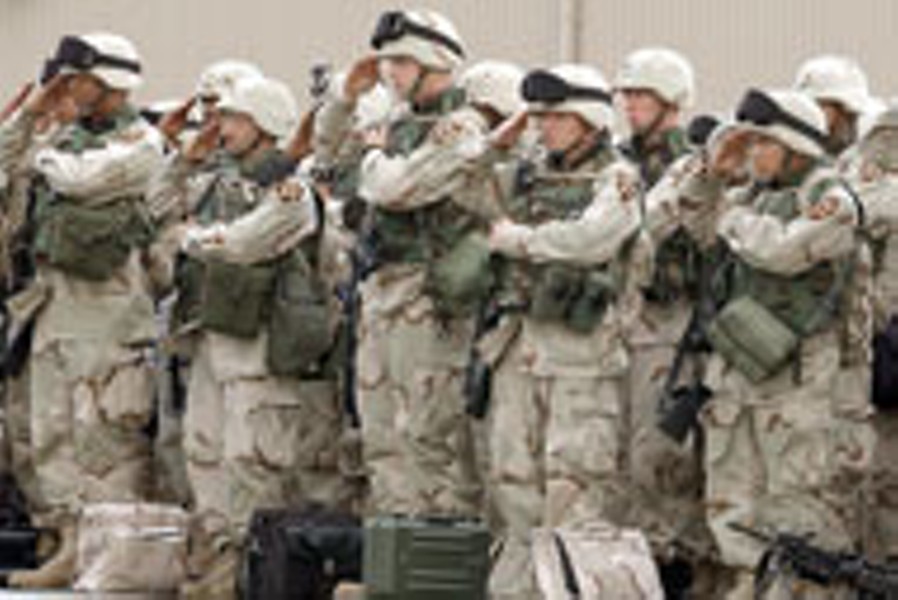Page 3 of 5
Some supporters of the status quo cry foul when the notion of poverty in the military is brought up, claiming that it's a myth, and often resorting to the old "Well, that's what they signed up for" argument. But people like Sherrill Hendrick with Community Connections for Military Families -- one of the largest military help organizations in the country, based in Tacoma, Washington -- and Larry Jones, founder of Feed the Children, bristle when they hear this kind of rhetoric.
Hendrick says the hue and cry during the last few years about military families on food stamps has brought more support and financial counseling for much of the regular military. But things are still tight, and quite a few members of military families hold down two jobs to make ends meet. When deployed, however, the civilian job has to go. Hendrick angrily asks if we're taking such good care of our regular military, why do so many military pregnant mothers have to use WIC -- and why do so many families still qualify for food stamps? She feels the families of our nation's defenders deserve better.
Larry Jones's organization Feed the Children is an international Christian relief group based in Oklahoma City which delivers food, medicine, clothing and other necessities to families suffering due to famine, war, poverty or natural disaster. Since large-scale deployments to Iraq started in December 2002, Feed the Children has delivered more than 50 trucks of food to military bases all over the country to aid the families left behind, including a delivery at North Carolina's Ft. Bragg.
"Sadly, in addition to risking their lives, thousands of service men and women are risking their livelihoods," said Jones. "Many of these soldiers have had to leave their families in a financial predicament to go fight the war. If we are going to live in the land of the free, we need to stop and thank the brave. The best way to do that is to help give them the peace of mind that comes from knowing that their families will be taken care of back home."
Reservists and Guard in hot water
The biggest financial challenges Hendrick is dealing with now are those of the Reserves and the National Guard who have been called to Iraq. These folks' salaries have been slashed to half and even less of what they made in their civilian jobs. These sometime soldiers expected to be called up here and there for a flood or a tornado; no one was planning financially for such a long deployment. The recruitment brochures for these organizations emphasize, in large print, that it's a "part time job while you live in the comfort of your home." And then there's one sentence unobtrusively placed in the brochure once or twice that has taken on more meaning lately: "And when international conflicts arise, the Guard stands alongside active forces."
One California National Guard Officer, identified as John Doe, has gone so far as to file a lawsuit to fight the "stop-loss" order that will effectively hold him prisoner in the Army National Guard when his term ends in December. Military officials insist that reservists know when signing on the dotted line that a possible extension of service is part of the deal. The reservists I spoke to, however, wryly note that the "extension of service" clause is deliberately downplayed by the military.
Hendrick says one of the biggest problems for Reservists and Guard members is the pay system, which is largely done by hand (payment for a weekend here and there). The system is being overhauled, but for now it's still being done by hand and Reservists and Guardsmen's families are getting their checks three and four months late. Consequently, they're losing their houses and cars -- and their wives are divorcing them in droves. If that's not bad enough, the "weekend" soldiers' families are also dealing with the prejudices of the regular active forces when they apply for help; they're often looked down upon as "part time." But as Hendrick reminds us grimly, "They bleed just as red."
In recent testimony before the House Government Reform Subcommittee on Efficiency and Financial Management, the pay problems of the Army Reserve, and their repercussions, were explained by Donald J. Campbell, US Army Reserve, LTC (ret) Past Commander of the 3423rd Military Intelligence Division (PD). He outlined irregularities with Government Issue Visa cards for per-diem pay issues. The methods used by Defense Finance & Accounting System were so byzantine and complex -- for both the DFAS and the Reservists -- a large number of the members of Campbell's unit were turned over to debt collectors by the DFAS for monies the organization itself had been responsible for paying them. After months of wrangling with mid-level bureaucrats after their deployment was completed, the unit's members finally got their good credit repaired. "I take no pleasure in telling the Committee that our unit and many other Reservists were victimized throughout our deployment, and then for months afterwards, trying to correct the wrongs done to us," Campbell testified. "...Many unit members, because of their civilian expertise, contributed to the Intelligence mission at such a high level they were asked to remain and take civilian Analyst jobs. All chose to go home."



